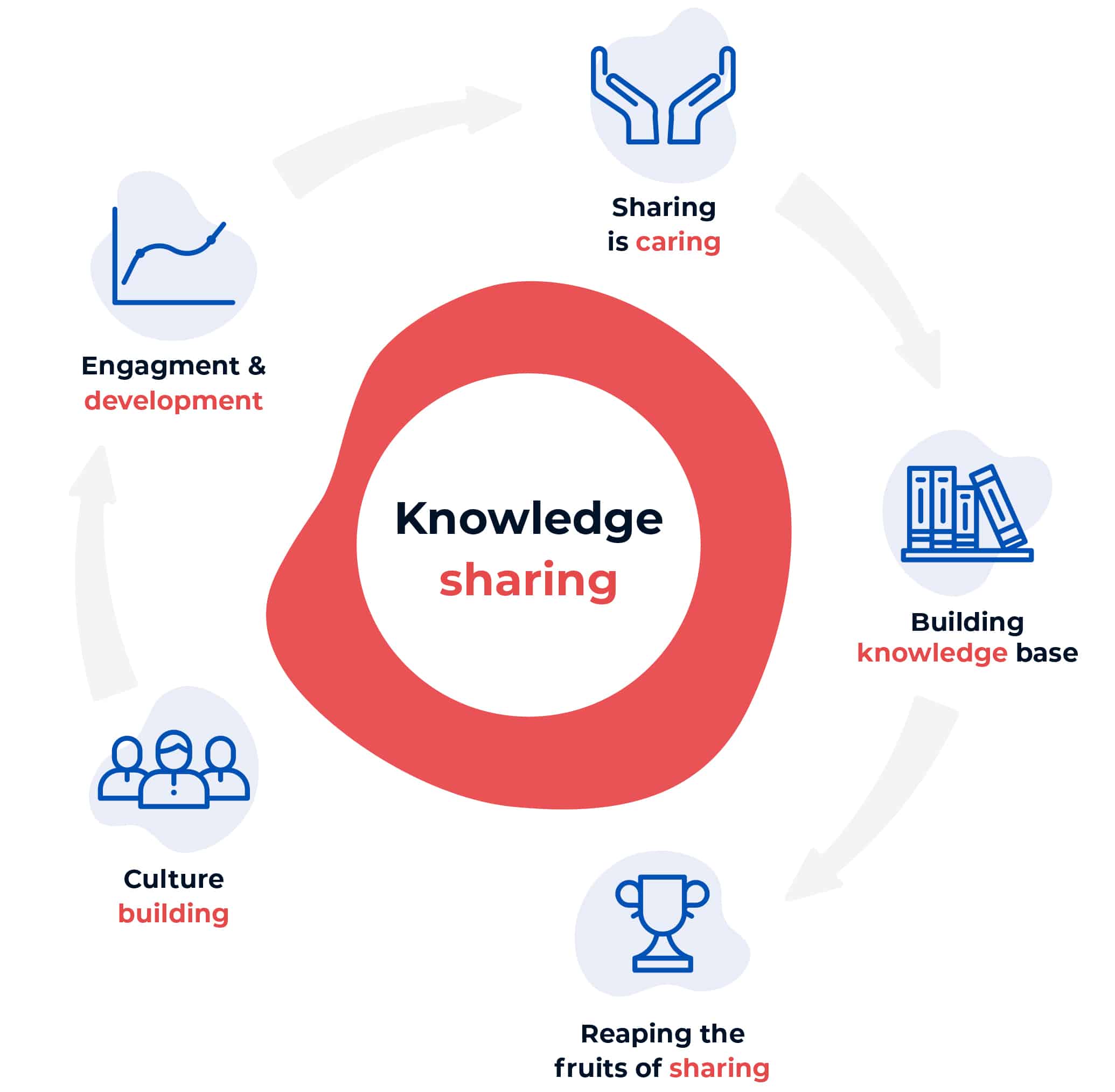We have come to live and work in particularly interesting times when change seems to be the only constant. According to the “2022 Global Talent Trends. The Reinvention of Company Culture” report, after the Big Quit triggered by the pandemic, we have now entered the time of the Great Reshuffle. As it turned out, the first movement was not about quitting but changing the occupation to a more fulfilling one, better suited to the employees’ needs. As a result, companies were forced to review and adjust their business strategies to the new circumstances in the face of an employee-prompted revolution. The company’s development strategies have had to change, especially, when it comes to knowledge sharing.
It all comes down to learning and development, upskilling, reskilling, and in the end, searching for purpose and fulfillment. When dealing with such a massive mindset change, employers have to act fast, or else they will lose the workforce to the progress-oriented competition. It’s high time to acknowledge the perks of contemporary knowledge sharing.
What is knowledge sharing and why is it important?
Broadly speaking, knowledge sharing happens when information is made available to those who are seeking it actively. Open access to learning enables immediate application of the acquired skills and insights for the benefit of the organization. We can single out three major constituents facilitating the knowledge sharing process: information technology, knowledge-sharing culture, and employee motivation. Let’s focus on the last two in particular.
What is the impact of knowledge sharing?
We are mindful of what knowledge sharing means and how it is facilitated. But before we move on to the benefits, let’s consider the actual impact of the discussed occurrence. If the working environment facilitates information exchange, teamwork, and new skills acquisition, the employees are more likely to strengthen as professionals, come up with optimized solutions and be simply more productive. The impact proves to be extensive, as it leads not only to increased effectiveness but most importantly to higher job satisfaction. The last driver turns out to be especially significant, as the job market is currently going through a mass reshuffle and companies are wary of losing their best people.
Benefits of knowledge sharing
The process of information exchange is beneficial for both the recipient and the provider. It boosts employee engagement, and, as a result, improves effectiveness. The gains are not reserved for the recipients only. The company’s investments in learning and development come back in the form of increased motivation of the employees. Knowledge sharing brings a myriad of benefits, but let’s delve into the ones which are most appealing and would reason even with the most hardened skeptics. To answer the question of why knowledge sharing is important in the workplace, we will expand on its five solid values to benefit from.
- Culture Building
- Engagement & Development
- Sharing is Caring
- Building Knowledge Base
- Reaping the Fruits of Sharing

Culture Building
First, it is worth highlighting what we tend to forget: people are the driving force of knowledge sharing culture. Built through an open-handed approach to learning, and supported by digital solutions, insight-sharing culture creates perfect conditions for thought exchange. Being a part of a knowledge-sharing community increases individual motivation and provides a sense of purpose. There are rather no benefits from keeping information to yourself, besides, nobody likes a knowledge hoarder. Meanwhile, sharing one’s work experience, for example through mentoring, might be a gratifying and empowering practice. Employees engage more willingly if a knowledge-sharing-friendly environment is facilitated by the company. A steady knowledge flow works like symbiosis. It’s mutually beneficial, as individual development contributes to the company’s sustainable growth and agility.
Engagement & Development
It is rather a straightforward task to connect the dots between employee engagement, personal development, and loyalty. According to Glint data, quoted in the latest Linkedin report on L&D (2022), “having opportunities to learn and grow is now the number 1 factor that people say defines an exceptional work environment.” Might be a shocker for some but the well-qualified specialists won’t settle with poor development prospects. Offering growth possibilities is one thing, however, making the learning process truly effective and engaging requires a bit of an effort and a well-suited knowledge sharing system. As the remote and hybrid work model has become the new standard, the learning together experience has altered as well. Supported by modern technology, we are able to participate and engage in group activities with no major loss. Aside from the social aspect of learning, a fun factor should not be overlooked in the process. Adding elements of gamification and rewards involves the learner on a deeper, more competitive level. The sense of achievement after each completed course can be strengthened by a personalized certificate. Let’s not forget that gaining knowledge should also work in favor of our well-being.

Sharing is Caring
We’re not making a discovery here but it’s still worth reminding the simple truth: sharing is caring. Being generous with knowledge builds trust and helps to connect not only on a professional level. Creating a knowledge sharing culture encourages collaboration between co-workers and proves to be truly bonding. Using a learning platform enables learners to share opinions, engage, stay connected, and be on the same page with other team members. Open access to information acts for the benefit of the employees by limiting the skill gap. After all, knowledge is a shareable asset not meant to remain concealed, else it’s not possible to enjoy its benefits fully. A well-addressed training program equals an investment in the company’s members. A contribution made on account of long-lasting cooperation.
Building Knowledge Base
Nowadays, immediate answers are in high demand. People tend to get frustrated if they spend too much time looking for a solution, which is supposed to be at hand. Creating a knowledge base improves information flow by limiting the redundant effort of constant search. Besides the obvious pros resulting from proper information storage and data transparency, building a knowledge base prevents the loss of know-how. Knowledge retention is crucial, as we no longer operate in the era of long-serving employees. Creating an easily accessible collective knowledge library prevents the explicit but also tacit information from perishing together with the moving employees.
Reaping the Fruits of Sharing
Last but not least, let’s not forget about the return on the knowledge sharing investment. Equal access to an up-to-date information base is way more efficient in terms of cost and time than coordinating multiple support training sessions on demand. Implementation of a well-suited LMS platform levels the development chances of the remote employees, who can follow the same training paths as their on-site co-workers. Streamlining processes or innovative leaps turn out to be the positive side-effects of the knowledge sharing culture. Through the process of free insights exchange, both company and workers capitalize on agility. Prioritizing employee development gives a competitive advantage to the employer, as people are more willing to work for a company that values their needs.
How to make it happen in your work environment?
Gaining knowledge and implementing it to the mutual benefit of your company and employees might become a valued part of your working culture. The benefits of knowledge sharing are unquestionable and easy to obtain, provided the learning process guarantees engaging content and a seamless learning experience. Digital learning solutions using social learning should not be underestimated when creating an insight-sharing culture in a company. Samelane provides assistance with optimizing organization’s knowledge management and automation of the employee training process.
If you’re considering such an improvement in your company, do not hesitate to contact us. We’ll arrange a free-of-charge consultation to discuss your needs and meet them with a tailored solution.










